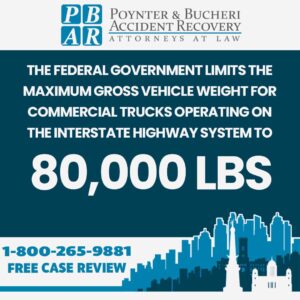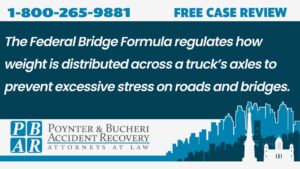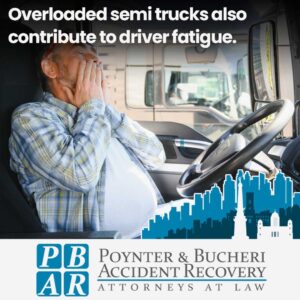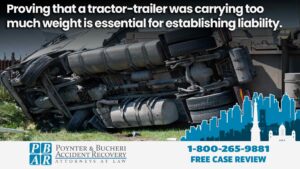
Overweight trucks are a serious safety hazard on Indiana roads. While commercial truck driver fatigue is a well-known cause of truck accidents, it’s not the only threat drivers and passengers face. When a semi truck exceeds legal weight limits, it becomes much harder to control, causing accidents. If this happens, you need an Indianapolis overload truck accident lawyer on your side.
These semi-truck accidents often result in life-altering injuries and extensive damage. If you’ve been involved in a truck-related accident, an experienced Indianapolis truck accident attorney at Poynter & Bucheri can help.
Call us today at 800-265-9881 or click here for a free consultation and trusted legal guidance.
What Is an Overloaded Truck Accident?
An overloaded semi truck accident occurs when a trucking company or truck driver loads a large truck with more weight than what is legally permitted under federal or state regulations. These weight limits are in place to protect everyone on the road and prevent truck accidents.
When a semi truck is overloaded, it becomes much harder for a truck driver to control—stopping distances increase, steering becomes less responsive, and the risk of brake failure or truck tire blowouts rises significantly. These hazards often lead to serious and even fatal Indianapolis truck accidents.
Federal and Indiana State Truck Weight Laws

Commercial vehicle weight limits are heavily regulated at both the federal and state levels to protect drivers and maintain roadway safety. The Federal Motor Carrier Safety Administration (FMCSA) sets national standards for weight limits, while Indiana state laws provide additional guidelines tailored to local road conditions and infrastructure.
When a semi truck exceeds these legal limits, the risk of serious accidents increases dramatically, and so does the legal liability for the trucking company, truck driver, and all parties involved.
Overloaded tractor-trailers are in direct violation of FMCSA regulations and Indiana statutes. These violations can become a central issue in personal injury claims, especially when an insurance company attempts to minimize or deny compensation.
An experienced Indianapolis truck accident attorney from our law firm can gather the necessary evidence, navigate regulations, and fight for the full compensation you deserve.
Federal Truck Weight Regulations
Under U.S. Code Title 23, § 127, the federal government limits the maximum gross vehicle weight for commercial trucks operating on the Interstate Highway System to 80,000 pounds. This total includes the semi truck, its cargo, fuel, and any passengers.
Federal Bridge Formula

The Federal Bridge Formula regulates how weight is distributed across a truck’s axles to prevent excessive stress on roads and bridges. Ensuring weight is spread properly helps reduce the risk of truck accidents involving mechanical failures and truck accidents caused by overloaded or unbalanced commercial vehicles.
Violating federal trucking regulations is serious, and when it leads to a semi truck accident, it may demonstrate negligence in a personal injury claim.
An experienced truck accident attorney can use these violations to prove fault and pursue the compensation victims deserve. Holding the trucking company accountable for ignoring federal weight limits is key to securing justice after preventable truck accidents.
Indiana State Truck Weight Laws
Indiana law largely aligns with federal weight standards but adds specific rules for local roads. Indiana Code § 9-20-4 sets weight limits for commercial trucks on state highways, while 105 IAC 10-3-1 governs the permit process for overweight and oversized vehicles.
Trucks exceeding legal weight must obtain a permit from the Indiana Department of Revenue’s Motor Carrier Services Division, which may include conditions on routes, timing, and maximum loads. Ignoring these rules increases the risk of commercial truck accidents, especially on smaller or congested roads.
Operating without a valid permit is a clear violation of state law. An experienced Indianapolis truck accident lawyer can use these violations to build a stronger case and help victims pursue compensation for their injuries, damages to other vehicles, and emotional distress.
Truck Accidents an Overloaded Truck Can Cause
Overloaded vehicles are significantly more dangerous than properly loaded ones. When a commercial truck exceeds its legal weight limits, it becomes much harder for the truck driver to operate safely. The added weight affects braking distance, steering responsiveness, and overall stability, increasing the likelihood of catastrophic injuries and fatal truck accidents.
These risks are exceptionally high on highways or in poor weather conditions, where semi-truck drivers and other large commercial vehicles have little time to react to sudden hazards.
Jackknife Accidents
An overloaded tractor-trailer is much harder to stop quickly. When a semi truck driver brakes suddenly, the excess weight can cause the trailer to swing out of alignment, folding into the cab at a sharp angle, much like a jackknife. These serious truck accidents are even more hazardous in wet or icy conditions, where reduced traction makes control even more difficult.
They often:
- Block multiple lanes of traffic
- Involve multiple vehicles in a chain-reaction car accident
- Trap smaller vehicles beneath the trailer, causing severe injury or even death
Jackknife truck accidents are commonly caused by sudden braking, speeding, or improperly loaded cargo that shifts during transit—all of which are more likely in overloaded vehicles.
Rollover Accidents
Trucks that are overloaded or unevenly loaded have a much higher center of gravity, which compromises their stability. This makes rollovers more likely in situations such as:
- Sharp turns or curves, especially on ramps or winding roads
- Sudden lane changes at high speeds
- When a truck driver overcorrects to avoid an obstacle or collision
Rollover semi truck accidents can crush nearby vehicles, spill cargo across the roadway, or lead to fiery explosions if flammable materials are involved. They also often point to negligence by the loading crew or trucking company.
Spilled Cargo
Overloaded semi-trucks are more likely to carry improperly secured cargo, especially when they exceed their design capacity. Excess weight stresses tie-downs, weakens structural components, reduces braking efficiency, and increases the risk of losing control. Shifting loads due to poor balance or worn equipment can lead to dangerous cargo spills, endangering nearby motorists and causing road obstructions.
When cargo isn’t properly fastened or the trailer is overstuffed, it can shift during transit and:
- Fall into the roadway, creating immediate hazards for nearby drivers
- Cause multi-vehicle pileups, especially at high speeds
- Lead to serious injuries from direct impacts or evasive maneuvers
Depending on the materials involved, these spills may include hazardous substances such as chemicals, industrial waste, or flammable products, posing a serious public safety risk and often requiring hazmat response.
These incidents not only endanger other motorists but also put commercial truck drivers at risk. Spilled cargo accidents frequently point to violations of trucking regulations, including those enforced by the Federal Motor Carrier Safety Administration (FMCSA), and may serve as strong evidence of negligence on the part of the trucking company, driver, or loading company.
Common Injuries After an Overloaded Truck Accident

Because overloaded large trucks are harder to control and more prone to catastrophic truck accidents, the serious injuries they cause are often severe, long-lasting, or even fatal. The sheer force of impact from a heavy commercial truck can leave victims with complex medical conditions that affect nearly every aspect of their lives.
Common injuries from semi-truck crashes include:
- Traumatic brain injuries (TBIs)
- Spinal cord injuries
- Broken bones and fractures
- Internal injuries
- Severe lacerations or crush injuries
- Emotional trauma and PTSD
In the most tragic cases, these car accidents result in death, and surviving family members may have grounds for a wrongful death claim. Serious injuries often lead to costly medical expenses, long-term treatment, and time away from work. An experienced Indianapolis truck accident lawyer from Poynter & Bucheri can help you explore your legal options and provide the quality legal representation you need to fight for the financial compensation you deserve.
Trucking Company Negligence in an Overloaded Truck Accident

In many truck accidents involving overloaded semi trucks, the trucking company may be partly responsible. Companies in the trucking industry are required to make sure their vehicles follow weight limits and that their truck drivers are properly trained and supervised. When trucking companies fail to meet these responsibilities, and that failure leads to a car accident, it may be considered negligence.
Common examples of trucking company negligence in truck accidents include:
- Failing to enforce weight limits or pressuring truck drivers to exceed legal loads to meet tight delivery schedules
- Improper loading or securing of cargo by cargo loaders can lead to load shifts, spilled cargo, or vehicle instability
- Skipping mandatory inspections and maintenance
- Negligent hiring or training, including allowing unqualified truck drivers to operate semi trucks or failing to instruct drivers on handling oversized loads
- Ignoring or falsifying driver logs, bypassing weigh stations, or violating rules set by the Federal Motor Carrier Safety Administration (FMCSA)
Overloaded semi trucks also contribute to driver fatigue, especially when truck drivers are pressured to meet unrealistic deadlines. When this is paired with poor supervision and driver negligence, the danger to everyone on the road grows significantly.
If a trucking company knowingly allows overloading or ignores safety regulations, it can—and should—be held liable for any resulting injuries, property damage, or fatalities. An experienced truck accident lawyer can investigate these failures and build a strong case to help victims pursue justice and full compensation.
Evidence That Can Show a Truck Was Overloaded

Proving that a tractor-trailer was carrying too much weight is essential for establishing liability in a commercial truck accident case. Both physical evidence from the crash scene and documentation maintained by the trucking company can reveal that the vehicle exceeded legal weight limits. These types of evidence play a critical role in holding negligent drivers and companies accountable.
Scene Evidence
- Skid marks or damaged pavement that suggest excessive braking or the inability to stop in time due to added weight
- Crushed other commercial vehicles or debris patterns consistent with the impact force of an overloaded truck
- Photographs or videos of the truck, spilled cargo, road conditions, or damage to nearby infrastructure
- Witness statements from nearby drivers, pedestrians, or first responders who observed the crash or the truck’s condition beforehand
- Analysis by accident reconstruction experts, who can assess the truck’s speed, movement, and crash dynamics regarding its load, often helps identify negligent drivers or unsafe driving behavior
Documentation Evidence
- Black box data (event data recorder) that captures speed, braking activity, and sometimes weight distribution or load stress
- Weigh station records, including scale readings, entry logs, and any inspection reports from before or after the crash
- Shipping manifests and cargo documents listing load type, declared weight, and point of origin
- Electronic Logging Devices (ELDs) that record driver hours, route details, and often cargo weight
- Maintenance logs and inspection reports, especially if the truck suffered equipment failure due to overloading
- Logs that may reveal distracted driving, fatigue, or schedule violations that contributed to the car accident
When presented by experienced truck injury attorneys, this evidence can demonstrate that the truck was improperly loaded and that this violation directly contributed to the accident. It also supports claims of negligence in the personal injury case against the semi-truck driver, the trucking company, or both.
Pain and Suffering Damages After an Overloaded Truck Accident

In addition to economic damages like medical bills and lost wages, victims of semi-truck related accidents may also be entitled to pain and suffering compensation. These non-economic damages are meant to account for the physical pain, emotional anguish, and overall disruption that the truck accident caused to other vehicles’ passengers.
From sleepless nights and chronic pain to depression, anxiety, and the loss of enjoyment in daily life, these damages help capture the full extent of what the victim has endured. However, an insurance company may attempt to undervalue these claims, which is why working with a skilled attorney is critical to pursuing the full amount you’re entitled to after a truck accident.
Factors That May Increase Pain and Suffering
Courts and insurance companies consider several factors when evaluating the value of pain and suffering. These include:
- Severity of the injuries
- Length and extent of medical treatment
- Impact on daily life and future
- Emotional and psychological trauma
- Disfigurement or permanent disability
How Pain and Suffering is Calculated
Unlike economic damages, pain and suffering damages don’t come with a receipt. Instead, they’re calculated using methods that attempt to quantify your severe injuries and emotional hardship.
- Multiplier Method: One of the most common approaches. The victim’s total economic damages (like medical bills and lost income) are multiplied by a number—typically between 1.5 and 5—based on the severity of the injury, recovery time, and long-term impact. For example, $100,000 in damages with a multiplier of 3 would result in $300,000 in pain and suffering.
- Per Diem Method: This method assigns a daily dollar amount—often based on the victim’s salary or estimated daily hardship—and multiplies it by the number of days the victim is expected to suffer. For example, $250 per day for 180 days would total $45,000.
Each method has pros and cons, and an insurance company may use its own internal formula to estimate pain and suffering, often undervaluing the claim. That’s why working with a skilled commercial truck accident attorney who knows how to present your case and push back against lowball offers is so important.
Contact Poynter & Bucheri Truck Accident Attorneys Today

Every day you wait after a truck accident makes it harder to preserve evidence and build a strong case. Semi-truck accidents often involve complex issues, like overloaded vehicles, federal safety violations, and pushback from insurance carriers trying to minimize your payout.
At Poynter & Bucheri, our Indianapolis truck accident lawyers know how to identify every liable party—from the truck driver to the cargo loaders—in accidents involving semi-trucks, and fight for the full compensation you deserve.
Our law firm offers a free, no-obligation consultation to discuss your situation and explain your legal options. Contact us today at 800-265-9881.
